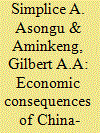|
|
|
Sort Order |
|
|
|
Items / Page
|
|
|
|
|
|
|
| Srl | Item |
| 1 |
ID:
184236


|
|
|
|
|
| Summary/Abstract |
We investigate persistence and determinants of deaths from conflicts in a sample of 163 countries for the period 2010–2015. The empirical evidence is based on the Generalized Method of Moments. First, the findings are contingent on income levels, religious domination, landlockedness, regional proximity, and legal origins. We find that the persistence of deaths in internal conflict is more apparent in coastal, French civil law, and Islam-oriented countries, compared to landlocked, English common law, Christian-oriented countries, respectively. Second, the following factors are generally responsible for driving deaths from internal conflicts: homicides, conflict intensity, and conflicts fought. Furthermore, incarcerations have negative effects on internal conflicts. Justifications for the established tendencies and policy implications are discussed.
|
|
|
|
|
|
|
|
|
|
|
|
|
|
|
|
| 2 |
ID:
125014


|
|
|
|
|
| Publication |
2013.
|
| Summary/Abstract |
This study dissects with great acuteness some of the big questions on China-Africa relations in order to debunk burgeoning myths surrounding the nexus. It reviews a wealth of recent literature and presents the debate in three schools of thought. No substantial empirical evidence is found to back up sinister prophesies of coming catastrophe from critics of the direction of China-Africa relations. In the mean, the relationship from an economic standpoint is promising and encouraging but more needs to be done regarding multilateral relations, improvement of institutions, and sustainability of resources management. A number of positive signs suggest that China is heading toward the direction which would provide openings for a multipolar dialog. While benefiting in the short run, African governments have the capacity to tailor this relationship and address some socio-economic matters arising that may negatively affect the nexus in the long term. Policy implications are discussed.
|
|
|
|
|
|
|
|
|
|
|
|
|
|
|
|
| 3 |
ID:
182522


|
|
|
|
|
| Summary/Abstract |
This study assesses how globalization modulates the effect of governance on carbon dioxide (CO2) emissions in sub-Saharan African countries. The empirical evidence is based on Generalized Method of Moments. The minimum level (or negative threshold) of Foreign Direct Investment required for it to interact with political stability and contribute toward the green economy is 45 percent of gross domestic product (GDP), while 90 percent of GDP is the maximum level (or positive threshold) required for trade to complement “voice and accountability” in mitigating CO2 emissions. Seventy-six percent of GDP and 80 percent of GDP are, respectively, negative trade thresholds for government effectiveness and economic governance. The corresponding negative trade thresholds for the rule of law, corruption-control, and institutional governance are, respectively, 230 percent of GDP, 63.5 percent of GDP, and 106.5 percent of GDP. Actionable openness policy thresholds are provided to inform policy makers on how governance interacts with globalization to promote the green economy.
|
|
|
|
|
|
|
|
|
|
|
|
|
|
|
|
|
|
|
|
|